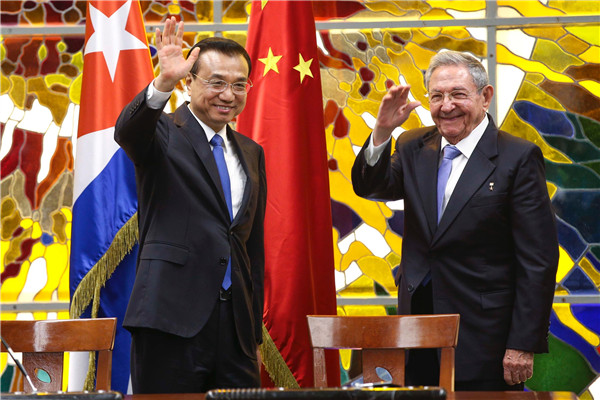
Premier Li Keqiang (L) and Cuban President Raul Castro witness the signing of some 20 cooperative agreements in areas including economic technology, finance, production capacity, telecommunication, environment protection, and inspection and quarantine after their talks at the Palace of the Revolution in Havana, Cuba, Sept 24, 2016. [Photo/Xinhua]
On the same day that Premier Li Keqiang made history in Havana, China and Cuba agreed to work together to boost the island nation’s economic development. Premier Li, who on Sept 24 became the first Chinese premier to visit Cuba in more than 50 years, vowed to help industrialize Cuba.
The consensus was reached in talks between Premier Li and Cuban President Raul Castro in Cuba’s capital.
The agreement could have a large impact on Cuba, where the economy last year grew at 4 percent year-on-year, according to China’s Commerce Ministry.
The Premier, who heads home on Sept 26, also oversaw the signing of more than 20 agreements in Havana to ramp up cooperation in wide-ranging areas including finance and infrastructure.
Premier Li arrived in Havana on Sept 24 after attending the 71st session of the UN General Assembly in New York and making an official visit to Canada. The Premier is scheduled to visit former Cuban top leader Fidel Castro-who celebrated his 90th birthday in August-on Sept 26. Fidel Castro is Raul Castro’s older brother.
Both China and Cuba are engaged in the pressing tasks of developing their economies and improving the livelihood of their people, Premier Li said. The Chinese side is ready to support Cuba’s industrialization, he said.
The two countries will work together on the planning of infrastructure construction projects, and launch cooperation in industrial equipment manufacturing.
Trade, financing and investment activities will be intensified between the two countries, the leaders agreed.
China is Cuba’s second-largest trade partner. Bilateral trade was valued at $2.2 billion last year, a surge of 58.7 percent from the 2014 level, according to Chinese customs officials.
Raul Castro said Cuba would borrow from China’s experience and expertise in development, and enhance pragmatic cooperation with China, said a statement which was released after their talks.
The two countries also will have more exchanges and collaboration in the world arena, joining hands to maintain the common interests of developing countries, the statement said.
Before their meeting, Premier Li attended a wreath-laying ceremony at the Monument to Jose Marti, a national hero for Cuba and an important figure in Latin American literature during the 1850s to 1890s.
After their talks, Premier Li and Raul Castro witnessed the signing of a score of intergovernmental agreements and business contracts covering a wide range of fields such as economy, technology, finance, industrial capacity cooperation, information communications, and inspection and quarantine.
Cuba maintains good political relations with China, said Xu Shicheng, a researcher in Latin American studies at the Chinese Academy of Social Sciences.
China could also increase investment in Cuba to help the country in infrastructure, food and the agricultural industry, internet connections and training of officials, Xu said, adding that both countries should expand military and security cooperation.
